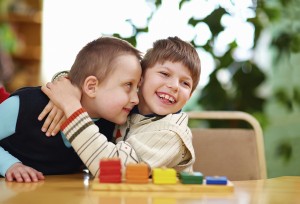There are lots of fun activities you can do with your children to encourage the development of healthy social skills. But how do you know that these lessons will stick? Oftentimes, a child may be great at doing a particular activity in a particular setting, but as soon as you move to the playground or the classroom these skills seem to disappear. How do you encourage the internalization of important social skills? Here at The Connections Therapy Center, we emphasize community-based learning, also known as natural environment teaching. This is a method of therapy that focuses on teaching children the skills they need in several different natural environments, rather than just in the therapy setting. This helps children to learn how to apply the skills they learn in several different environments, which is also known as carryover. Here are a few activities you can try with your child in different natural environments that will encourage the carryover of important social skills.
Social Skills Activities That Encourage Carryover
These activities can help reinforce foundational skills that promote healthy social interactions. Try these activities with your child and their peers to see what works best.
- Listening skills: In this scenario, your child is the teacher! Give your child a rubric to judge their peers’ answers to prompts. Your child can ask the prompts and judge their peers’ responses based on the rubric. Your child can help their peers with answers by pointing to visual cues. Students can take turns asking questions and providing answers. This means they’ll get to practice being patient, listening to responses, practicing eye contact, and asking relevant questions. This game can be played at home, at school, in the car, etc.
- Teamwork: Play games that encourage children to work together to accomplish a task. Whatever the task, encourage them to work together. There should be different roles–such as reader, writer, and speaker–that you can assign or children can decide amongst themselves who is best for each role. This means that each child will have to work together, listen to each other, and take turns sharing ideas for solutions.
- Role playing: Have kids act out a text that you read. Children will have to listen to the text and think about how the character feels, what expressions they would have, and how they would act. This helps children to analyze a text as well as practice social skills.
The Connections Therapy Center
The Connections Therapy Center serves families of children and adolescents with disabilities and special needs. We are a team of experts in the fields of pediatric speech, occupational therapy, speech-language pathology, and behavioral sciences. As a team, we offer intensive hands-on therapy for children and adolescents, as well as informative and useful resources for families. If you are interested in learning more about what we can do to help your family, visit us online or give us a call at (202) 561-1110 (Washington, D.C. office) or (301) 577-4333 (Lanham office). Want to get more information on how to help your child thrive? Follow us on Facebook, Twitter, LinkedIn, Google+, and Pinterest.
Source: 1

